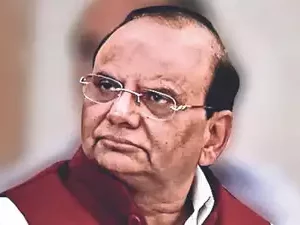In a significant development for Delhi’s ever-expanding metro network, Lieutenant Governor VK Saxena has granted his approval for the acquisition of approximately 2,000 square meters of land. This decision marks a significant stride forward in the ambitious Phase 4 expansion plan, which aims to enhance the capital’s public transportation system.
Delhi’s metro system has been a game-changer for the city, revolutionizing the way its residents commute and significantly reducing traffic congestion and pollution. The relentless efforts to extend and improve this network reflect the city’s commitment to providing efficient, sustainable, and convenient public transportation.
Phase 4 of the Delhi Metro expansion has long been in the works and has been eagerly awaited by the city’s residents. It is designed to not only extend existing lines but also introduce new ones, thereby increasing metro connectivity to various corners of Delhi and its neighboring areas. This expansion aims to further alleviate the burden on the city’s road infrastructure and reduce travel times.
The recent approval by Lieutenant Governor VK Saxena is a significant step towards realizing the Phase 4 expansion plan. The acquisition of land is a crucial aspect of this development, as it paves the way for the construction of three new metro lines. The LG’s consent underscores the administration’s commitment to ensuring that the city’s infrastructure keeps pace with its burgeoning population and evolving transportation needs.
The three new metro lines, made possible by the acquisition of land, promise to enhance connectivity across the city. This will not only make commuting more convenient but will also encourage more residents to rely on public transport, thereby reducing the number of private vehicles on the road. In turn, this should contribute to a reduction in traffic congestion and a decrease in air pollution, addressing critical environmental concerns.
The expansion of the Delhi Metro network is not just about improving transportation. It is also a proactive step towards mitigating the environmental challenges posed by rapid urbanization. As more people shift to public transport, the city is likely to experience reduced emissions, which is a significant win for air quality and the overall well-being of its residents.
Moreover, the economic impact of the metro expansion cannot be overstated. The improved connectivity will enhance access to various parts of the city, fostering commercial growth and boosting property values along these newly established metro corridors. This, in turn, could lead to economic opportunities and employment prospects for many.
With LG VK Saxena’s approval for land acquisition, Delhi’s Phase 4 metro expansion plan takes a substantial step forward. The city can look forward to more comprehensive and accessible metro services in the near future. However, it is important to acknowledge that such ambitious projects require careful planning, execution, and continuous monitoring to ensure they meet their intended goals while minimizing any adverse impacts.
As the wheels of progress keep turning, the people of Delhi can anticipate an increasingly connected and eco-friendly city, thanks to the tireless efforts and strategic initiatives that are shaping the future of public transportation.










